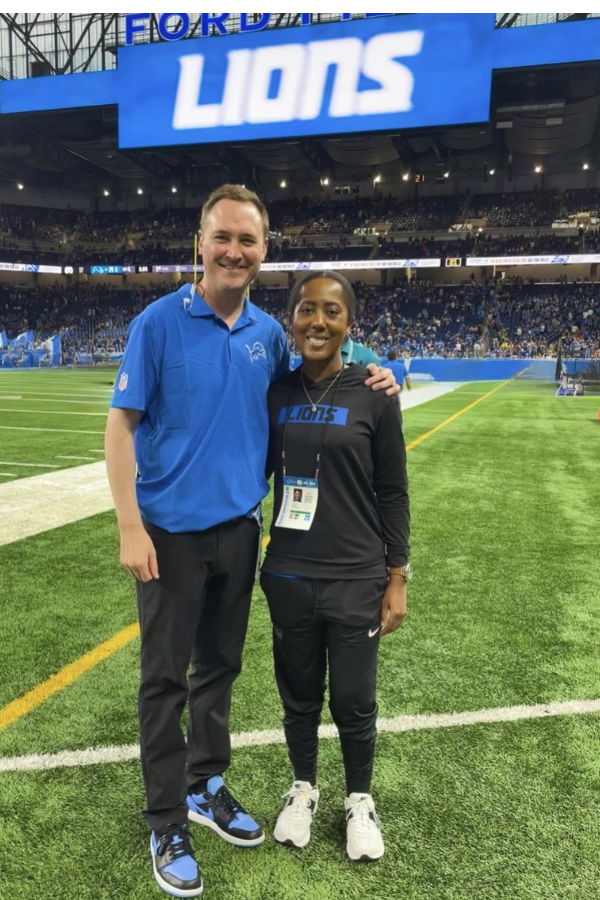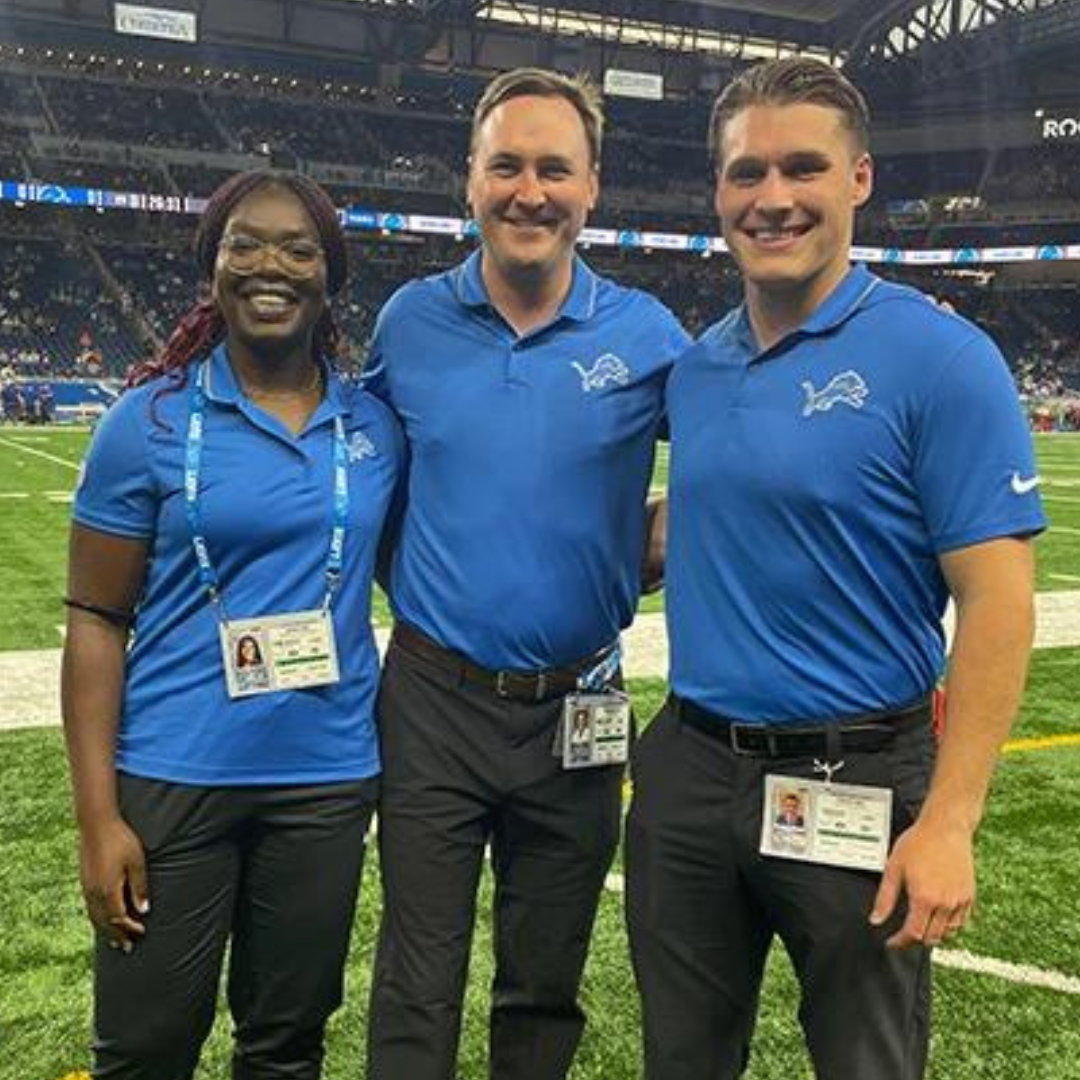Behind the Scenes: Marquisha Myles' time with the Detroit Lions medical staff
September 19, 2024
For College of Human Medine student Marquisha Myles, a passion for orthopedic surgery and sports medicine took her from the classroom to the sidelines of the NFL. Chosen as part of this year’s NFL Sports Medicine Pipeline Program, she spent a month working with the Detroit Lions medical staff, gaining firsthand experience in what it takes to care for professional athletes.
In this Q&A, Marquisha reflects on how the opportunity taught her about the importance of representation and collaboration in medicine and shaped her perspective on the future of sports medicine—and her own career path.
 Can you tell us what initially drew you to the NFL Sports Medicine Pipeline Program?
Can you tell us what initially drew you to the NFL Sports Medicine Pipeline Program?
My passion for orthopedic surgery and sports medicine made this initiative an incredible opportunity. I was attracted by the chance to work in an elite environment and gain firsthand experience in sports medicine. The NFL's program presented an amazing opportunity to observe and learn from physicians who treat high-performance athletes, providing me with invaluable insights.
Who were some of the key professionals you worked with in the Detroit Lions medical team? How did their expertise impact you?
I had the privilege of working closely with the athletic trainers, strength and conditioning coaches, nutritionists, and team physicians. Each professional played a vital role in the team’s overall health and performance. Their collaborative approach showed me how interconnected these specialties are in supporting athlete health. From them, I learned about the critical interplay between injury prevention, rehabilitation, and nutrition, which has greatly deepened my understanding of holistic care in sports medicine.
Did you get to work directly with the players? How was that?
Yes, I worked directly with the players in the training room, where I assisted the athletic trainers and other medical staff. It was inspiring to witness the players’ dedication to their health and performance. Beyond that, the personal connections I made were invaluable. We discussed not only their treatments but also life off the field—family, travel, hobbies—which gave me a more well-rounded view of the players as individuals, not just athletes. It was an amazing learning experience to see how their mental and physical well-being go hand-in-hand.
What was the most unexpected or surprising part of working within a professional sports team environment?
The most surprising aspect was the strong sense of unity and teamwork that extended beyond just the players and coaches. Every staff member, from the medical team to operations, worked together seamlessly, embodying a collective commitment to excellence. I felt welcomed into this community and was impressed by how each individual’s role contributed to the team’s success. This level of cohesion was inspiring to witness and demonstrated how essential every person’s expertise is to the overall functioning of a professional sports team.
Were there any specific cases or challenges you encountered during your rotation that helped you grow as a medical professional?
I think stepping into an environment like the NFL can be intimidating due to the high stakes and visibility of professional sports. However, this experience strengthened my ability to remain composed and focused under pressure. Working with the players, who place immense trust in the medical staff, required me to balance empathy with my understanding of precision.
What was your biggest takeaway from this experience, both personally and professionally?
My biggest takeaway was the importance of communication and teamwork in medicine. While the players are the focus, the entire team, from physicians to trainers, must collaborate fluidly to ensure the athletes’ health. This experience reinforced that effective teamwork and respect for each role in the care process are key to delivering exceptional outcomes. Personally, it taught me the value of adaptability and staying open to learning in fast-paced environments.
How do you think this opportunity will influence your future career in medicine?
This rotation solidified my desire to pursue orthopedic surgery. It not only gave me exposure to cutting-edge treatments and rehabilitation techniques but also reinforced the importance of patient-centered care in critical settings. Moving forward, I plan to integrate the lessons I’ve learned about multidisciplinary teamwork, adaptability, and patient engagement into my practice.
Do you have any advice for other students who may want to apply for opportunities like this in sports medicine?
My advice would be to go for it, even if it feels outside of your comfort zone. Programs like this are designed to challenge and grow your understanding of medicine in dynamic ways. I would also recommend being proactive—ask questions, seek out mentorship, and engage with everyone from the medical staff to the players. It’s an invaluable opportunity to learn, and it will push you to become a better clinician.
How did this initiative help you see the importance of representation in your field?
This initiative opened my eyes to the crucial role of representation in sports medicine. Seeing professionals who look like me and come from diverse backgrounds working in these positions was both inspiring and empowering. It reinforced the idea that diversity in medicine isn’t just important for the medical team, but for the athletes and patients we serve. Representation fosters trust and opens doors for future generations, ensuring that sports medicine continues to grow in inclusivity.
Do you have anything else you’d like to add?
I’m incredibly grateful for the opportunity to participate in the NFL Sports Medicine Pipeline Program. It was an experience that will undoubtedly shape the rest of my career, not just in terms of the medical knowledge I gained, but also the personal growth and relationships I developed. I look forward to applying these lessons to my future practice and contributing to the field in meaningful ways.
By Nadija Kadunic
More Sports Medicine News ![]()
Hear more from Marquisha on a recent episode of "MSU Today with Russ White" on WKAR.
In 2023, Tamarandobra (Dobra) Ogeh, was the first College of Human Medicine student to participate in the NFL Sports Medicine Pipeline Program.


